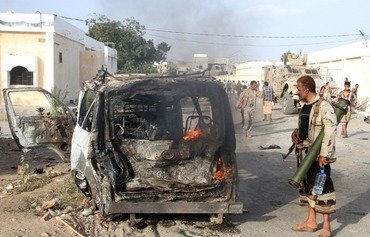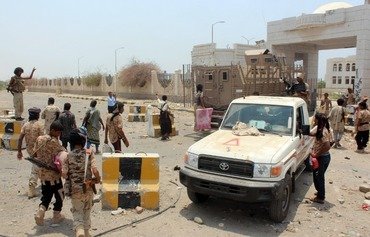The Yemeni government has reaffirmed its commitment to combating terrorism and eradicating hotbeds of extremist in the wake of a deadly March 27th al-Qaeda attack on a government compound in Lahj province.
Following the attack in al-Houta, Lahj put in place strict security measures and raised the level of alert to respond to any potential attack by al-Qaeda or the "Islamic State of Iraq and Levant" (ISIL), officials told Al-Mashareq.
The attack began when al-Qaeda fighters tried to drive an explosives-laden vehicle into the temporary headquarters of the security directorate and the Lahj province local authority.
Yemeni forces opened fire on the vehicle, and the attackers returned fire.
Security forces killed nine al-Qaeda fighters, including three wearing explosives belts and others armed with guns, when the assailants attacked the building following the initial bombing, AFP reported.
Six soldiers and four civilians were killed in the bombing and gunfight, and two soldiers and two civilians were wounded, a Yemeni official said.
Al-Qaeda claimed responsibility for the attack.
Hightened security measures
In a message to the families of the victims, Prime Minister Ahmed Obaid bin Dagher affirmed Yemen's determination to continue to fight terrorism.
He described the attack as "cowardly and devoid of moral and humanitarian values", Yemeni media reported.
In a statement, the local authority said the attack began with an attempted suicide bombing involving a passenger van and a pickup truck at the external gate of the Health Bureau.
The attack at the gate of the bureau, now the temporary headquarters of the security directorate and local authority, was followed by an attack in which gunmen dressed in military uniforms tried to breach the building’s wall.
Lahj deputy governor Awad bin Awad al-Salahi told Al-Mashareq the security committee met on March 28th, the day after the attack, and took a series of measures to raise the level of readiness in the province.
"The security arrangements were in effect before and after the incident, because we expected the terrorist elements to carry out surprise terrorist attacks from time to time," he said.
Security forces in Lahj province have taken strong deterrent measures against al-Qaeda, pursuing and capturing many and forcing the rest to hide, he said.
"Security forces continue to pursue and apprehend these terrorist elements who seek only to carry out subversive and destructive schemes against mankind and the country," al-Salahi added.
At its meeting, the security committee adopted new security arrangements and additional preventive measures intended to "avert the element of surprise and ensure that such attacks are not repeated", al-Salahi said.
Strong condemnation
Lahj province governor Mohammed Salam told Al-Mashareq the people of Lahj have strongly condemned these crimes.
"The people of Lahj are peaceful and in favour of security, stability and institution-building in the province," he said, adding that residents are working on the side of the state and stand against terrorism and extremism.
The people of Lahj "totally and completely condemn any terrorist act, whether it occurs in Lahj or any other Yemeni province, a stance shared by Yemenis in other provinces, who likewise condemn such acts", he said.
He stressed that terrorist attacks have no basis for justification in Islam, and run "contrary to humanitarian laws and conventions".
Despite the casualties it claimed, the March 27th incident demonstrated "the vigilance of security personnel", who were able to fight back and eliminate the attackers, political affairs researcher Adnan al-Humairi told Al-Mashareq.
He called on the local authority to work towards boosting the security forces’ strength with more troops and military equipment to prevent a retaliatory attack by al-Qaeda elements, who are versed in "guerrilla warfare".
Clerics and religious scholars also must play a role in "eradicating the hotbeds of terrorism and extremist ideology in the minds of the youth", al-Humairi said, adding that poverty makes them particularly vulnerable to recruitment.
"Al-Qaeda exploits these factors in its recruitment operations as it takes advantage of these difficult and complex humanitarian conditions," he said, noting that extremist groups have exploited Yemen's war to expand.

![A Yemeni man looks at a burning vehicle following an al-Qaeda bombing in al-Houta, the provincial capital of Lahj, on March 27th. [Saleh al-Obeidi/AFP]](/cnmi_am/images/2017/04/04/7556-Yemen-Lahj-AQ-600_384.jpg)





